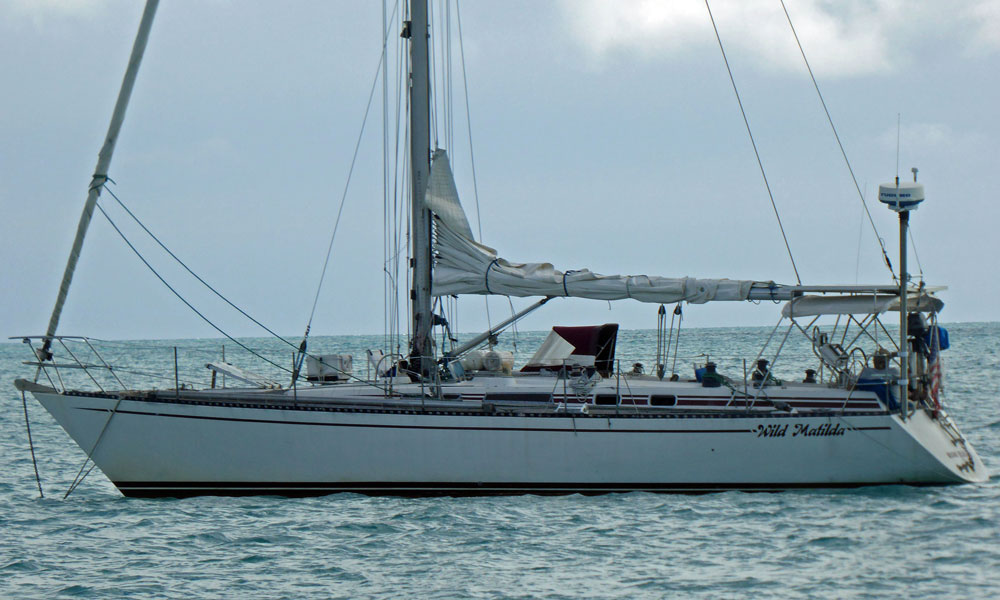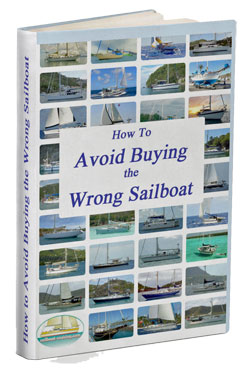The RH 43 Sailboat
Specs & Key Performance Indicators
The RH 43, a masthead sloop, was designed by Ron Holland and built in Taiwan by Ta Chiao Shipbuilding.
Published Specification for the RH 43
Underwater Profile: Fin keel with skeg-hung rudder
Hull Material: GRP
Length Overall: 42'8" (13.0m)
Waterline Length: 33'10" (10.3m)
Beam: 13'0" (4.0m)
Draft: 6'9" (2.1m)
Rig Type: Masthead sloop
Displacement: 23,780lb (10,787kg)
Designer: Ron Holland
Builder: Ta Chiao Shipbuilding (Taiwan)
Year First Built: 1985
Published Design Ratios for the RH 43
1. Sail Area/Displacement Ratio: 16.7
- Less than 16 would be considered under-powered;
- 16 to 20 would indicate reasonably good performance;
- Over 20 suggests relatively high performance.
2. Ballast/Displacement Ratio: 39.5
3. Displacement/Length Ratio: 274
- Under 100: Ultralight
- 100 to 200: Light
- 200 to 275: Moderate
- 275 to 350: Heavy
- Over 350: Ultraheavy
4. Comfort Ratio: 33.1
- Under 20 indicates a lightweight racing boat
- 20 to 30 indicates a coastal cruiser
- 30 to 40 indicates a moderate offshore cruising boat
- 40 to 50 indicates a heavy offshore boat
- Over 50 indicates an extremely heavy offshore boat
5. Capsize Screening Formula: 1.8
- Under 2.0 (the lower the better): Better suited for ocean passages
- Over 2.0: Less suited for ocean passages
Summary Analysis of the Design Ratios for the RH 43
1. A Sail Area/Displacement Ratio of 16.7 suggests that the RH 43 will, in the right conditions, approach her maximum hull speed readily and satisfy the sailing performance expectations of most cruising sailors.
2. A Ballast/Displacement Ratio of 39.5 means that the RH 43 will initially stand up reasonably well to her canvas in a moderate breeze, but she'll need a reef in the main to avoid heeling excessively in a gust.
3. A Displacement/Length Ratio of 274 tells us the RH 43 is a moderate displacement cruiser, which means she'll carry all your cruising gear without it having a dramatic effect on her performance. Most of today's sailboats intended for offshore cruising fall into this displacement category.
4. Ted Brewer's Comfort Ratio of 33.1 suggests that crew comfort of a RH 43 in a seaway is similar to what you would associate with the motion of a moderate bluewater cruising boat - a predictable and acceptable motion for most seasoned sailors.
5. The Capsize Screening Formula (CSF) of 1.8 tells us that a RH 43 would be a safer choice of sailboat for an ocean passage than one with a CSF of more than 2.0.
RH 43: A Bluewater Cruiser with Style and Performance
The RH 43 is a 42.67-foot masthead sloop designed by Ron Holland (hence RH 43), a renowned naval architect who has created many successful racing and cruising yachts. The RH 43 was built in fiberglass by Ta Chiao Shipbuilding in Taiwan.
Accommodation
The RH 43 has a spacious and well-lit interior that can accommodate up to six people in three cabins. The forward cabin has a V-berth with storage lockers and a private head with a shower. The main saloon has a U-shaped settee to port that can convert into a double berth, and a large folding table that can seat up to eight people. To starboard, there is a straight settee that can also serve as a single berth, and a navigation station with a chart table and instruments. The galley is located aft of the saloon to port, and it has a three-burner stove with an oven, a double sink, a refrigerator, and ample counter space and storage. The aft cabin has a double berth to starboard, a hanging locker to port, and access to the second head with a shower.
Rigging and Sails
The RH 43 has a deck-stepped aluminum mast and stainless steel standing rigging. The sail area is 860 square feet, which gives the boat a sail area to displacement ratio of 16.6. This means that the boat has enough sail power to perform well in light to moderate winds, but it may need some help from the engine in very light airs or strong gusts. The boat has a slab reefing mainsail with two reef points, and a roller furling genoa on the forestay. The sails are controlled by two primary winches and two secondary winches on the cockpit coaming, and two halyard winches on the mast. The boat also has a spinnaker pole for downwind sailing.
Cockpit and Steering
The RH 43 has an aft cockpit that can seat up to six people comfortably. The cockpit is protected by a dodger, and it has cushions, speakers, and storage lockers. The helm station has a pedestal-mounted wheel steering system with a hydraulic power assist. The helm station also has an engine control panel, an autopilot, a compass, and other instruments. The boat has an emergency tiller that can be attached to the rudder post in case of steering failure.
Engine and Tankage
The RH 43 is powered by a Perkins 4154M diesel engine that produces 50 horsepower. The engine is located under the cockpit sole, and it can be accessed from the aft cabin or the cockpit hatch. The engine drives a three-bladed fixed propeller through a shaft drive system. The boat has a fuel capacity of 90 gallons, which gives it an average cruising range of about 450 nautical miles at 6 knots. The boat also has a water capacity of 80 gallons, which may not be enough for long-term cruising without a watermaker or frequent refills. The boat has two heads, each with a holding tank.
Performance and Seaworthiness
The RH 43 is a boat that is designed for bluewater cruising, meaning that it can handle offshore and ocean sailing conditions. The boat has a hull speed of 7.8 knots, which is the theoretical maximum speed that it can achieve under sail power. However, the boat can also sail faster than its hull speed in favorable winds and waves, especially when using a spinnaker. The boat has a comfortable motion at sea, thanks to its moderate displacement and ballast. The boat is also easy to handle and maneuver, thanks to its well-balanced rig and steering system. The boat has a capsize screening value of 1.8, which means that it is unlikely to capsize in normal sailing conditions.
Pros and Cons
The RH 43 is a boat that has many positive attributes, such as:
- A spacious and well-lit interior with three cabins and two heads;
- A masthead sloop rig with a slab reefing mainsail and a roller furling genoa;
- A moderate displacement hull with a fin keel and a skeg-hung rudder;
- An aft cockpit with a wheel steering system and hydraulic power assist;
- A Perkins diesel engine with a shaft drive system and a fixed propeller;
- A bluewater cruising capability with a comfortable motion and good performance.
However, the boat also has some weaknesses or limitations, such as:
- A limited water capacity of 80 gallons
- A moderate sail area to displacement ratio of 16.6, which may require engine assistance in very light winds;
- A draft of 6.75 feet, which may restrict access to some shallow waters;
- A deck-stepped mast, which may be less strong than a keel-stepped mast.
This article was written with the assistance of Gemini, a large language model developed by Google. Gemini was used to gather information, summarize research findings, and provide suggestions for the content and structure of the article.
Recent Articles
-
CSY 44 Sailboat: Comprehensive Review, Specs & Performance Analysis
Feb 22, 26 10:41 AM
An in-depth review of the CSY 44 sailboat. Discover technical specifications, design ratios, and why this heavy-displacement cruiser remains a top choice for ocean voyagers. -
Irwin 54 Sailboat: Comprehensive Review, Specs & Performance Analysis
Feb 22, 26 07:24 AM
An expert review of the Irwin 54 sailboat. Explore technical specifications, design ratios, cruising capabilities, and why this shoal-draft yacht is a liveaboard favourite. -
Beneteau Oceanis 473 Review: Specs, Performance & Cruising Guide
Feb 20, 26 04:49 AM
An in-depth review of the Beneteau Oceanis 473. Discover technical specifications, design ratios, and why this Groupe Finot design remains a top offshore cruising choice.

